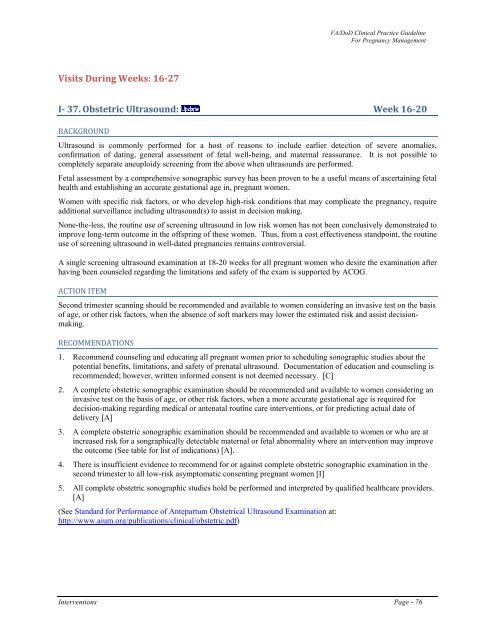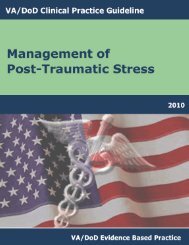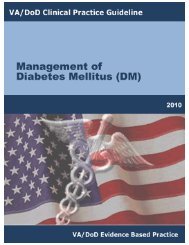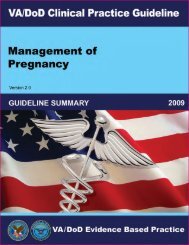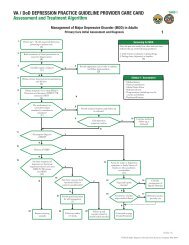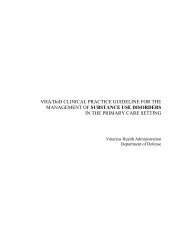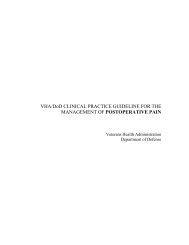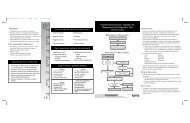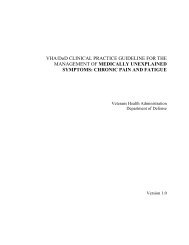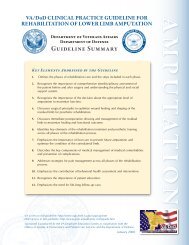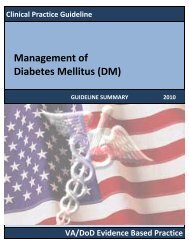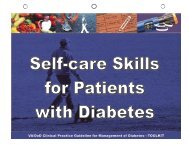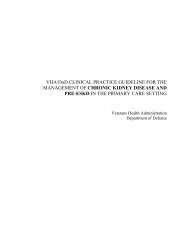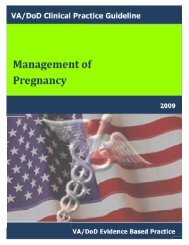Management of pregnancy - VA/DoD Clinical Practice Guidelines ...
Management of pregnancy - VA/DoD Clinical Practice Guidelines ...
Management of pregnancy - VA/DoD Clinical Practice Guidelines ...
You also want an ePaper? Increase the reach of your titles
YUMPU automatically turns print PDFs into web optimized ePapers that Google loves.
<strong>VA</strong>/<strong>DoD</strong> <strong>Clinical</strong> <strong>Practice</strong> Guideline<br />
For Pregnancy <strong>Management</strong><br />
Visits During Weeks: 1627<br />
I 37. Obstetric Ultrasound: Week 1620<br />
BACKGROUND<br />
Ultrasound is commonly performed for a host <strong>of</strong> reasons to include earlier detection <strong>of</strong> severe anomalies,<br />
confirmation <strong>of</strong> dating, general assessment <strong>of</strong> fetal well-being, and maternal reassurance. It is not possible to<br />
completely separate aneuploidy screening from the above when ultrasounds are performed.<br />
Fetal assessment by a comprehensive sonographic survey has been proven to be a useful means <strong>of</strong> ascertaining fetal<br />
health and establishing an accurate gestational age in, pregnant women.<br />
Women with specific risk factors, or who develop high-risk conditions that may complicate the <strong>pregnancy</strong>, require<br />
additional surveillance including ultrasound(s) to assist in decision making.<br />
None-the-less, the routine use <strong>of</strong> screening ultrasound in low risk women has not been conclusively demonstrated to<br />
improve long-term outcome in the <strong>of</strong>fspring <strong>of</strong> these women. Thus, from a cost effectiveness standpoint, the routine<br />
use <strong>of</strong> screening ultrasound in well-dated pregnancies remains controversial.<br />
A single screening ultrasound examination at 18-20 weeks for all pregnant women who desire the examination after<br />
having been counseled regarding the limitations and safety <strong>of</strong> the exam is supported by ACOG.<br />
ACTION ITEM<br />
Second trimester scanning should be recommended and available to women considering an invasive test on the basis<br />
<strong>of</strong> age, or other risk factors, when the absence <strong>of</strong> s<strong>of</strong>t markers may lower the estimated risk and assist decisionmaking.<br />
RECOMMENDATIONS<br />
1. Recommend counseling and educating all pregnant women prior to scheduling sonographic studies about the<br />
potential benefits, limitations, and safety <strong>of</strong> prenatal ultrasound. Documentation <strong>of</strong> education and counseling is<br />
recommended; however, written informed consent is not deemed necessary. [C]<br />
2. A complete obstetric sonographic examination should be recommended and available to women considering an<br />
invasive test on the basis <strong>of</strong> age, or other risk factors, when a more accurate gestational age is required for<br />
decision-making regarding medical or antenatal routine care interventions, or for predicting actual date <strong>of</strong><br />
delivery [A]<br />
3. A complete obstetric sonographic examination should be recommended and available to women or who are at<br />
increased risk for a songraphically detectable maternal or fetal abnormality where an intervention may improve<br />
the outcome (See table for list <strong>of</strong> indications) [A].<br />
4. There is insufficient evidence to recommend for or against complete obstetric sonographic examination in the<br />
second trimester to all low-risk asymptomatic consenting pregnant women [I]<br />
5. All complete obstetric sonographic studies hold be performed and interpreted by qualified healthcare providers.<br />
[A]<br />
(See Standard for Performance <strong>of</strong> Antepartum Obstetrical Ultrasound Examination at:<br />
http://www.aium.org/publications/clinical/obstetric.pdf)<br />
Interventions Page - 76


